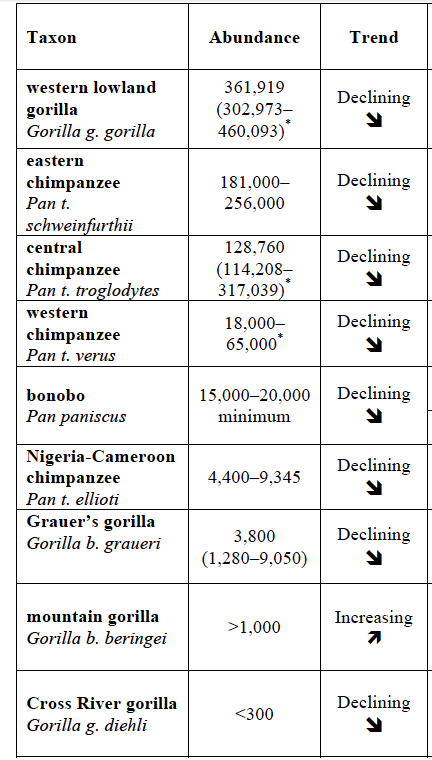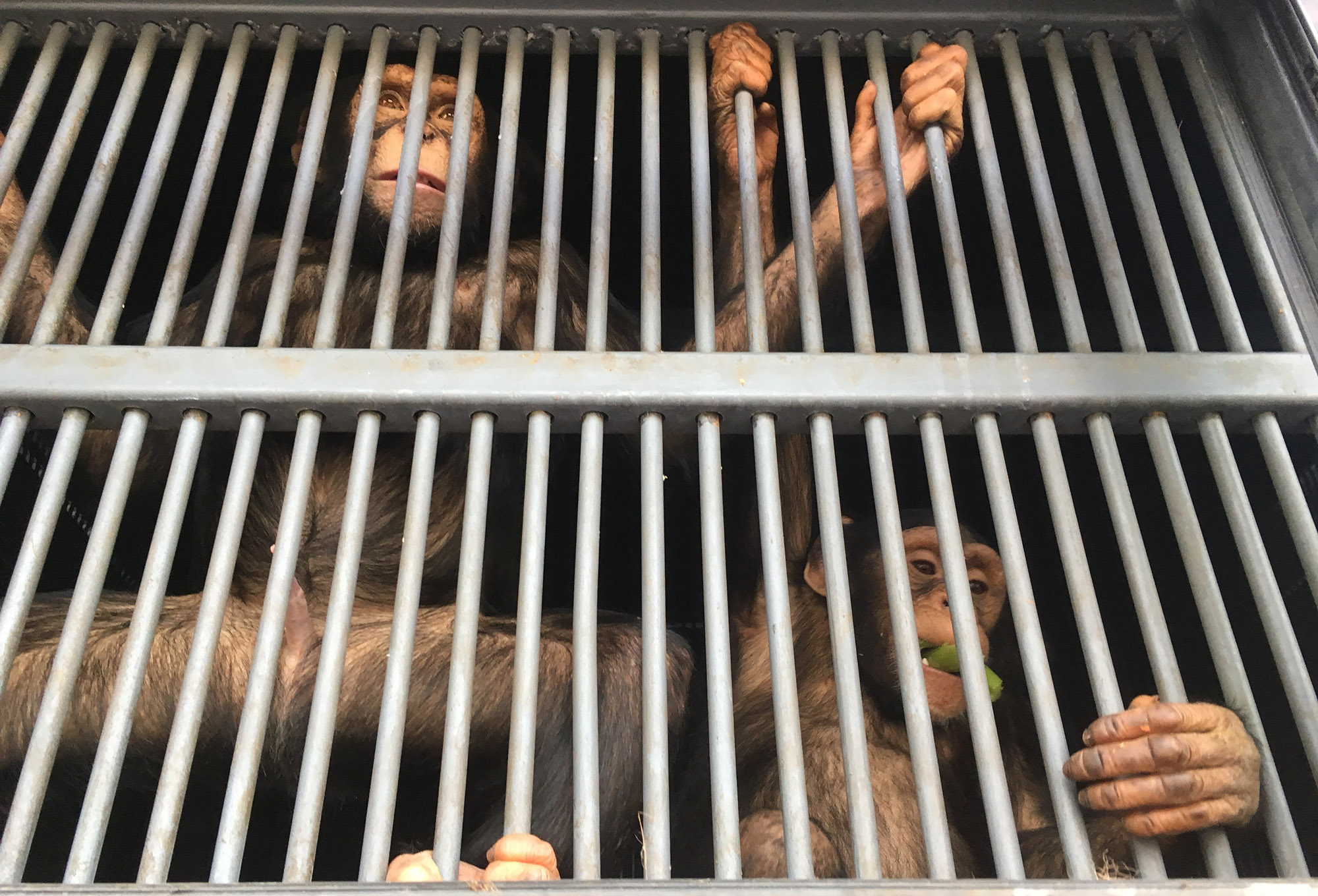If a wild animal has monetary value it’s a prelude to extinction. That’s because the cheapest way to acquire that animal is to poach it. Across Africa, control of poaching is dismal, haphazard, often corrupt and the increase in the value chain from the forest floor to the foreign consumer is eye-watering. As a result, the scale of wildlife extraction is best compared to a vacuum cleaner.
This is very bad news for chimps. They’re endangered and listed as Appendix 1 by the Convention on International Trade in Endangered Species (CITES), meaning they may not be captured in the wild or traded for commercial purposes. But in Central and West Africa’s rain forests they’re high on poacher’s lists and are disappearing at an alarming rate. There are only around 200,000 left and the numbers are dropping fast.
 The International Union for the Conservation of Nature (IUCN) estimates that all four subspecies will face between a 50% to 80% decline over the next three generations. A report in 2010 estimated that poachers, villagers and local workers were killing 8,000 chimps, gorillas and bonobos a year for their meat. Under Covid-19 lockdown, this has escalated dramatically. Both a driver and a by-product of this hunting is the capture of baby chimps for sale, mainly to China.
The International Union for the Conservation of Nature (IUCN) estimates that all four subspecies will face between a 50% to 80% decline over the next three generations. A report in 2010 estimated that poachers, villagers and local workers were killing 8,000 chimps, gorillas and bonobos a year for their meat. Under Covid-19 lockdown, this has escalated dramatically. Both a driver and a by-product of this hunting is the capture of baby chimps for sale, mainly to China.
The source
Chimps are dependent on forest ecosystems. They have slow rates of reproduction due to their prolonged maturation and high investment in single (occasionally twin) offspring. Age at first reproduction is late, their young take a long time to develop, with interbirth intervals between four and nine years, depending on the species.
Their populations are, therefore, highly vulnerable to even low levels of offtake and unable to cope with significant and continued killing of individuals. Losses in some subspecies are now so drastic that their viability is in doubt.
Populations are threatened by the combined impacts of habitat loss, degradation and fragmentation, poaching, disease and illegal trade. According to the IUCN, 42% of the central chimpanzee geographic range is considered suitable for oil palm, which could become a major threat as most chimps are not within reserves.
In eastern DRC, armed groups involved in artisanal mining are responsible for much of the bushmeat poaching. Loggers build roads into the rainforest and rely on bushmeat to feed workers for whom it has become a necessity. This is leading to “empty forest syndrome”.
There are also major problems with enforcement, public- and private-sector corruption, insufficient resources for investigators in developing and developed countries, local community challenges and abuse of social media and financial service companies.
One of the cruellest among many cruel poaching activities is the marketing of baby chimps. It’s estimated that about 100 are exported each year, though that’s a conservative estimate as many die before their final destination.
This is a species that depends on family ties and they defend their young. To capture a baby, the usual tactic used by poachers is to shoot as many of the adults in a family as possible to ensure they get babies who hang on to their mothers as they climb into the canopy. It’s estimated that poachers kill up to 10 which can then be sold as bushmeat. That constitutes an annual loss of thousands of adults a year.
In the transport of baby chimps, bribes are involved all along the route – police, military, government officials such as CITES Management Authority officials paid to look the other way or issue fake or falsified permits, customs officers and local staff of the airline companies on which the shipments are loaded.
The biggest African trafficking networks, according to a Global Financial Integrity (GFI) investigation, are connected to a Guinean-based company named Doumbouya Pets Company which operates in six Central African countries as well as the Sidibi and Traore families. The exception is buyers from royal families in Gulf states who use their own private planes to pick up shipments.
/file/dailymaverick/wp-content/uploads/Don-africaChimps-Young-chimp.jpg)
Chinese zoos only want baby chimps because they can be taught to perform, a violation of CITES Appendix 1 and 2. Adults can be difficult to train and babies are popular with the public in the new Chinese safari parks and zoos.
The profits
The average annual retail value of the international market for live infant and juvenile chimps, according to the GIF investigation, may be up to $6.4-million. Specialised illicit networks, often with direct or tacit support from senior government or military officials, smuggle the products and the money with minimal disguise and adapt to take advantage of new connections to poachers and buyers.
Money changes hands along the supply chains using cash in local currencies, wire transfers that are largely in US dollars and online payment services. The buyer and the seller connect via a platform such as Facebook, Instagram or WhatsApp where the seller posts photos of the animals available. They then move to a social media app that facilitates money transfers, particularly China’s WeChat, for the actual transaction or sale.
In the DRC, middlemen who base themselves in Kinshasa get an order and a deposit from a buyer. They call their “collectors” in the interior by mobile to order the “goods” which are sent to them in Kinshasa by river, road or internal flights. Chimpanzees and bonobos from the Mbandaka area get to Kinshasa via boat down the Congo River.
 GFI tracked the chimp value chain from village to final destination, exposing retail margins that would be the envy of any stockbroker. A local trader will pay a village-level poacher $5 and $50 for a baby chimp and on-sell it to a middleman for $50 t0 $100. The middleman will have contacts enabling him to get $500 to $1,000 from a local exporter who will be paid between $20,000 and $30,000 by a foreign agent. The final buyer in China or Russia would pay his local agent about $70,000 a chimp if it arrives alive.
GFI tracked the chimp value chain from village to final destination, exposing retail margins that would be the envy of any stockbroker. A local trader will pay a village-level poacher $5 and $50 for a baby chimp and on-sell it to a middleman for $50 t0 $100. The middleman will have contacts enabling him to get $500 to $1,000 from a local exporter who will be paid between $20,000 and $30,000 by a foreign agent. The final buyer in China or Russia would pay his local agent about $70,000 a chimp if it arrives alive.

The primary foreign buyers of Africa’s great apes are in Eastern Europe, the Middle East and China where they’re used as displays of wealth and commercial entertainment. According to the GFI report, chimps are sometimes given as gifts to VIPs to grease business deals if they are exotic pet collectors. In the UAE, Kuwait and Qatar wealthy families want a baby chimpanzee or baby gorilla in their gardens as status symbols.
The C Scam
Chimps that are second generation captive bred are listed as Appendix 2 and may be exported. They’re listed as “C” on CITES permits. In Central Africa, from where baby chimps are extracted, there are no captive breeding facilities, yet most have permits signed, stamped and marked C.
This is what Swiss wildlife photographer and film-maker Karl Ammann, who has been campaigning against chimp trafficking for many years, calls the C Scam. This is how it works.
CITES has no policing arm, all permits are paper based and not electronic and CITES officials in source countries are as susceptible to bribery as anyone else. A fraudulent export with all the relevant stamps and signatures permit can be purchased under the counter for between $3,000 and $5,000. Given the eventual profits of the trade that’s pocket money.
/file/dailymaverick/wp-content/uploads/Don-africaChimps-option-3.jpg)
According to Ammann, Chinese companies that import wild animals have long-standing links with animal traders in, for example, Guinea. “Those traders say ‘Hey, we’ve got chimpanzees, want some?’ So someone goes to a zoo and asks if they want chimpanzees. And of course they do, because they can use the chimpanzees to perform and make more money.
“Then the animal trader asks the CITES office in Guinea if they can export chimpanzees and of course the answer is no, as the country doesn’t have any captive chimpanzees. But in Africa, you hand over a bit of money and they list the animal as having been raised in captivity and give you the export licence.
“China is equally corrupt. For a CITES I listed specimen, the import permit has to be issued first and the CITES authority of China has to confirm it’s not a wild-caught chimp. They happily do this for a corresponding bribe which generally is a multiple of what it is in Africa.
“Then they just have to get a certain number of buyers together and put in an order to the seller in Africa. In China there are companies that manage the imports – they take care of the entire importation process. It’s all illegal dressed up as legal.”
If CITES rules were strictly enforced it would be very easy to uncover the illegal trade. CITES has lists of approved breeders as well as which animals can be bred and by which bodies. It’s all online. China only started to import chimpanzees in 2007, so it would have been easy to check that.
CITES could invoke Article VIII of its convention which allows it to penalise countries involved in illegal trade and provide for confiscation. But it doesn’t do that because, according to Ammann, the CITES secretariat is involved in covering up a wide range of corrupt and criminal acts.
Countries in West and Central Africa from which the chimps come have no CITES-approved breeders, Ammann points out. So any imports from there simply cannot have been bred in captivity, much less be second generation.
Even in terms of Appendix 2, wild animals may not be exported if it endangers the wild population, and it clearly does in the case of chimps.
It’s not just chimps or China. There have been cases where licences to import four tortoises to the UK have been changed to four elephants, or a permit for 5,000 parrots was altered to import elephants.
Chimps have even been exported from South Africa, a country without an indigenous population. When 18 were sold to China by Mystic Monkeys and Feathers Wildlife Park in Limpopo in 2019, the sale raised concerns among environmental NGOs that they were not captive bred.
In a letter to the Minister of Environment, Barbara Creecy, the EMS Foundation said the export permits were questionable, there was no documentation about the origin of the chimps and two females were pregnant, a fact that would annul any genuine CITES permit.
According to Ammann, South Africa does not have a chimpanzee studbook used to record the origins of chimpanzees and the country’s lax wildlife laws may be providing a useful backdoor for illegal shipments.
He says he has often alerted Chinese officials to illegality in chimp trading. Their reply is that all the information China has comes from the exporter and they accept whatever they’re given. “They say there haven’t been any mistakes on the Chinese side. If there were any mistakes, they were made in the exporting country.”
The destination
China is the major destination for illegally traded chimps, with the others going to the Middle East and Russia. China is opening more and more wildlife parks and there’s a huge demand for zoo attractions like elephants, chimps, gorillas, orangutans and orcas. The legality of the acquisitions seems a secondary consideration, if at all.
“I visited six or seven zoos in China, and my assistant went to others,” said Ammann. “Everywhere we went we saw chimpanzees either locked in cages or performing on stage or used as photo props. There were even different chimp families locked up in a single cage or in solitary. China doesn’t have experts on raising chimpanzees – you can’t put them together like that. Chimps are really suffering in China.”
He says Chinese zoos have adopted a feel-good explanation – they claim they’re saving baby chimps from the horrors of poaching in Africa. The Beijing Wildlife Park had their story carefully worked out in the information board beside the cages (translated from Chinese):
“At the beginning of last century, one chimp family disappeared in Tanzania near a scientist camp. The scientists found government staff had saved these illegally traded chimps from the black market.
“They found their homeland had been wiped out so they decided to keep and raise them in Johannesburg, South Africa.
“After 100 years, South Africa became unstable and owners of chimp farms were attacked and kidnapped. They had to close their farms and asked help from China. Beijing Wildlife Park responded to their trouble immediately and offered the help by receiving their chimps.”
Together with the text are large pictures of chimp bushmeat markets.
This is pure spin in response to bad press about baby chimp capture. Naturally, the zoo’s probable complicity in the deaths depicted was not mentioned.
Chimpanzees are our nearest genetic relatives on the tree of life. At this rate, eaten or forced to entertain zoo visitors or wealthy sheikhs, they’re heading for extinction. CITES seems unable to stop the slide and African governments don’t appear to consider it a problem. Ammann has been warning the world about this for decades, incurring huge personal cost and often placing his life at risk, but few seem to be listening. DM/OBP





 (Photo: EMS Foundation)
(Photo: EMS Foundation)